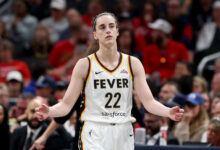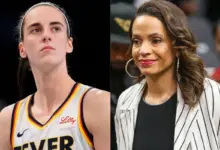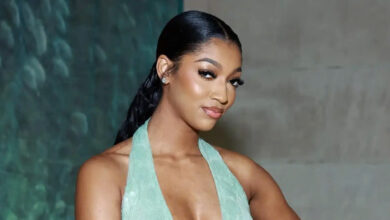Ryan Clark stands with Caitlin Clark as controversy rains on the WNBA sensation: “She’s even being attacked by those that look like her”
Ryan Clark stands with Caitlin Clark as controversy rains on the WNBA sensation: “She’s even being attacked by those that look like her”
Never in the past has a WNBA player received as much public scrutiny for being named the TIME magazine Athlete of the Year. No player has received that honor—until Caitlin Clark. However, the issue of race that publicly divided the association in the wake of her breakout season was amplified by that honor.
Her comments on racial dynamics have ignited fierce debate, including criticism from prominent figures.
Harsh criticism
Fresh off an electrifying rookie campaign, Clark earned Rookie of the Year honors while helping the WNBA secure record-breaking viewership and endorsement deals.
But amid her achievements, the Indiana Fever guard avoided addressing the league’s racial dynamics during her TIME interview. She acknowledged her privilege as a white player in a league built on the success of Black athletes and wanted them to be elevated more.
Clark’s comments, however, sparked a backlash, particularly from news personality Megyn Kelly, who criticized the young star for “bending over backward to apologize for her race.”
Kelly’s remarks gained traction after she accused the rookie of being on her knees apologizing for being white. Prominent voices in sports media weighed in soon after. Ryan Clark, an ESPN analyst and former NFL player, defended the Fever guard.
“In being an ally, and in being a voice, and then using her platform, she’s even being attacked by those that look like her,” Clark said. “Megyn Kelly said that Caitlin Clark was on her knee apologizing. And Caitlin eloquently answered it, ‘No. I just think I’m aware. I’ve always tried to understand what was going on around me. And I’ve always focused on blocking out the noise.”
CC’s rise has underscored long-standing racial tensions in the WNBA. During her Rookie of the Year campaign, discussions of race dominated headlines, particularly as comparisons were drawn between the 22-year-old and players like Angel Reese. The Chicago Sky standout was reportedly part of a growing rivalry with the Iowa product that extended beyond the court, highlighting deeper issues of race and representation in the league.
The broader dilemma
The WNBA owes much of its foundation to Black athletes. Legends like Sheryl Swoopes, Lisa Leslie, Candace Parker, Cynthia Cooper, and Maya Moore elevated the league to global prominence.
The Fever star herself acknowledged this history in her comments. White stars like Sue Bird and Breanna Stewart played significant roles in shaping the WNBA’s modern era. But Clark’s immediate popularity, combined with her race, has positioned her as a divisive figure.
“And it seems like because Caitlin Clark, just simply based on her color, she became an idol, or she became a trophy piece for the white community in a sport that was dominated by Black women. And they wanted to set her apart when all she’s truly ever wanted to do was be a part of the team,” Clark said.
The tension comes at a precarious time for the WNBA, experiencing newfound momentum. Record viewership during the 2024 season, alongside multimillion-dollar endorsements for players like the Indiana star, has given the league an unprecedented platform.
However, unresolved issues around race could jeopardize its fragile growth. Without addressing these tensions, the WNBA risks alienating fans and players alike at a time when unity is critical to sustaining its momentum.




